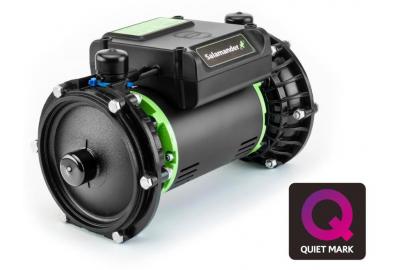Subsribe to our email newsletter today to receive product news and special offers!
Looking to boost the water pressure across the home or to a single shower? Shower pumps offer an excellent solution to low water pressure. When choosing which model to purchase, noise can be an important factor to consider.
All shower pumps make some noise, but the type of noise differs depending on the type of pump installed. There are two types of shower pumps available, regenerative and centrifugal.
Why do pumps make noise?
Regenerative pumps, such as the Salamander CT Xtra and CT Force, use an impeller to whip water around the end of the pump, the water is stripped from the impeller by a stripping block. Stripping the water from the impeller causes the pump to make a different type of noise to a centrifugal pump.
Centrifugal pumps use centrifugal force to throw the water outwards, this creates a higher pressure within the chamber which forces the water out of the pump. Removing the need to strip water from the impeller makes these pumps more flow efficient and quiet. Salamander Pumps’ Right Pump range of centrifugal shower pumps are extremely quiet, including the RP50PT which is the quietest twin ended shower pump in the UK.
Together with the CT Xtra, CT Force and HomeBoost ranges, Salamander’s Right Pumps have been awarded the Quiet Mark for being some of the quietest pumps available.

Installation tips for reducing noise
The noise of a shower pump will also be impacted on by its installation.
Vibrations passed from the pump to the surface it is sitting on will lead to unnecessary noise, this can be mitigated by fitting the noise reducing pump feet and installing a pump mat.
Vibrations can also be transferred into the pipework, therefore it is important to ensure that pipework is clipped and secure, and that the anti-vibration hoses have been installed and are kept straight.
Aeration will also cause unnecessary noise, correct installation can prevent this. The CT range of shower pumps must be teed from the first downward leg, this will prevent air from entering the pump. Installing a flange will also ensure that the water entering the pump from the hot water cylinder contains minimum air, this is a requirement for the Right Pump range.
Reasons why shower pumps may be unusually noisy
All shower pumps make some noise, however if the pump begins to make a different or an unusual noise then it may be for one of the following reasons.
High temperature water will cause the damage to the internal components of the pump, resulting in the pump seizing. If this happens the pump will start to make a humming or buzzing noise. The watershould be no higher than 65C in the hot water cylinder, to ensure that damage to the pump is avoided.
Aeration can also cause a buzzing noise. To prevent aeration, ensure that a flange is fitted, and that the pump has its own dedicated feeds. A gravelly or grinding noise is caused by severe aeration.
When the pipework supplying the pump hasn’t been properly secured a rattling noise may occur. Ensure that anti-vibration hoses are used and that the pipework is securely clipped to prevent this noise.
An intermittent noise or the pump starting up on its own is the result of a leak in a system where a negative head pump has been installed. A drip in the system will cause a pressure drop in the system, which will cause a negative head pump to start up.






